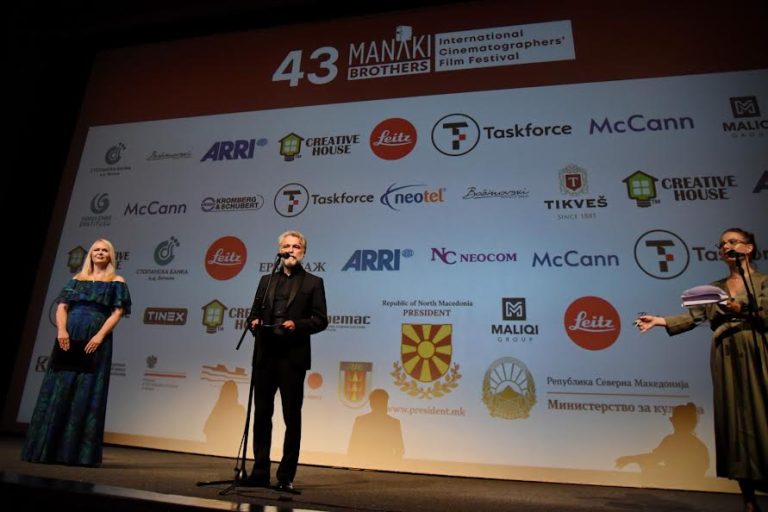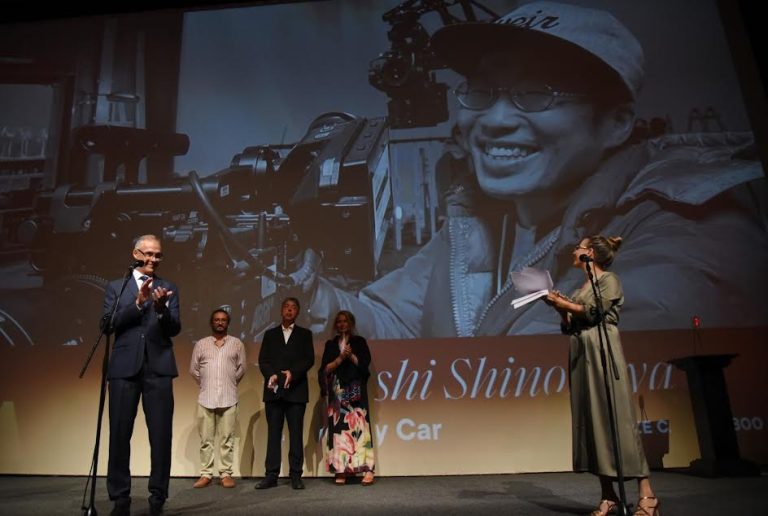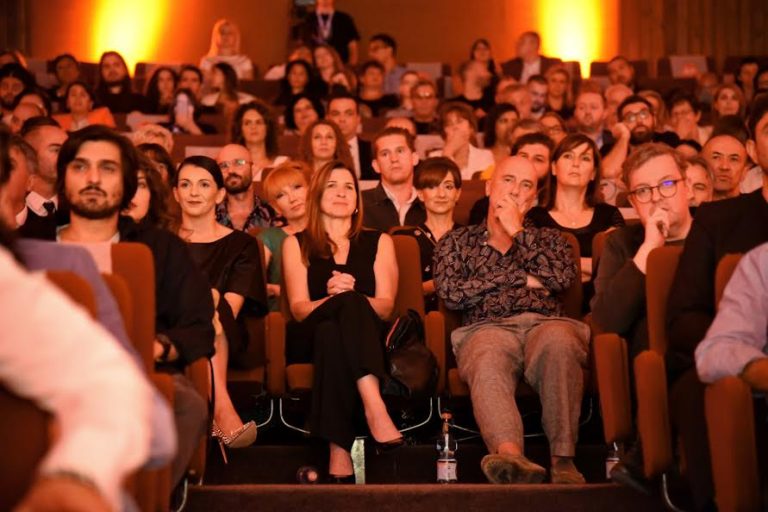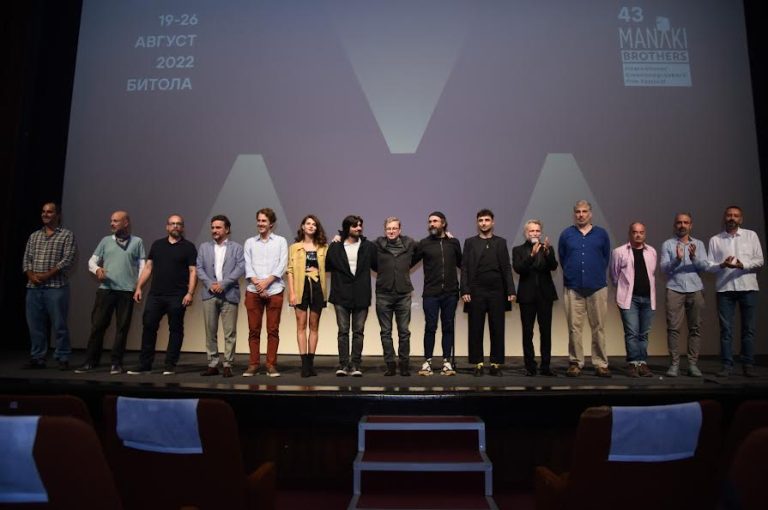
Stories keep on living as long as there’s someone to tell them. The stories that we weave at the “Manaki Brothers” Festival are among the original stories, the stories that storytelling started with, from the first time they were narrated, we keep telling them and retelling them in our own words and pictures, through the lens of our own insufficient reality.
Our time tells its stories from its own perspective, in its own context, giving them a new, different meaning. Stories keep on living as long as they are being told, as long as there are being cherished and bathed in a new light, in a new longing for a new reality.
This year’s edition of the “Manaki Brothers” Film Festival brought along its own reality and showed us that whenever reality is not enough, the art of cinema is here to offer an alternative, and carry us away towards the eternity of cinema, sailing down the ocean of motion pictures.
Every year ICFF “Manaki Brothers” celebrates the best cinematographers, but another very important segment is also the Student Programme which fosters the future of cinema. Starting from this year, the Student Programme is of a competitive character and offers an array of films from the best European Film Academies.
“The Best Student Film Award goes to the film “Widow and Orphan”, directed by Niklas Pollmann with Simone Hart and Christian Neuberger as cinematographers. The film comes from the Austrian Film Academy”, said the Programmer of the Student Programme, Gjorgi Pulevski.
The jury behind this decision consists of Mitko Panov, Fejmi Daut and Blagoja Kunovski – Dore.
“The award for Best Student Film goes to “Widow and Orphan”: for its deeply emotional portrayal of youth, estrangement and hope. A brilliantly shot film which tells the story in a unique way, not unlike the poetic cinema of Wenders and Malick. Told with a style, the film evolves through a multi layered narrative – as a visual stream of consciousness and in a liberating, experimental, fashion”, said the jury’s statement.
The film director received the award and expressed his gratitude to the DoPs, the jury, the team he worked with and the team of festival volunteers, particularly Angela, a festival volunteer, because, as he said, he had promised her that if he won an award, he would dedicate it to her.
It is true that reality is not enough, but how can we turn this reality into art? Turning reality into art is the major challenge in documentary cinema. The jury consisting of Jasmin Bašić, Fejmi Daut and belit sağ was evaluating the films from the Documentary Programme and decided to present the Iron Camera 300 for Best Documentary to the film “Mara” by Sasha Kulak, which proposes an aesthetically and conceptually bold perspective to the politically turbulent times we are going through. It not only brings us to the headspace of the people who are exposed to political violence in different degrees but also offers cinematic approaches as tools for engagement with the political urgencies and lived experiences. It achieves this strong stance without aestheticizing the experienced violence nor alienating the audience.
The Documentary Jury also decided to give a Special Mention to a formally daring and strongly politically committed film that goes beyond genres. Skilfully playing with fiction codes and exploring new feminist narratives, the film succeeds in offering a troubling portrait of contemporary Brazil. The Special Mention goes to “Dry Ground Burning” by Adirley Queirós and Joana Pimenta.
When reality is not enough, we always wonder how to squeeze an entire story into the short feature film form, in the best possible way. Short features are always a great challenge for filmmakers. The Jury consisting of: Maja Bogojevic, Samir Ljuma, Jean-Marie Dreujou – the Jury President, Carlos Diaz and Melisa Sözen, deliberated on the awards from the Short Film Programme and the Main Competition – “Camera 300”.
“We had a wonderful Festival; we saw quite a lot of films from both the Short Film Programme and the Main Programme. The “Small Camera 300” goes to Shadi Chaaban for the short film “Warsha”, for perfectly crafting a great memorable visual poem combining traditional film language with new technology, thus reflecting the deeply suppressed feelings of the protagonist”, said jury member Samir Ljuma.
Over the past eight festival days, “Manaki Brothers” celebrated cinema and great cinematographers. The City of Bitola was one of the most important festival centres in Europe. The programme consisted of Oscar-winning films, films from the festivals in Cannes, Venice, Berlin. That’s why choosing the best cinematographers was not an easy task.
“The “Bronze Camera 300” goes to Hidetoshi Shinomiya – “Drive my Car”, for the subtle and solid cinematography poetically conveying touching human stories of tenderness which resonate universally”, said Carols Diaz, Jury Member.
The winner of the “Silver Camera 300” was presented by Maja Bogojevic.
For the wonderfully nuanced and picturesque portrait of life in Napoli and the precise and consistent framing in this beautiful love letter to Fellini with autobiographical overtones, the “Silver Camera 300” goes to Daria D’Antonio for the movie The Hand of God.
Daria sent a message thanking the jury and everyone she met during her stay in Bitola.
The “Golden Camera 300” goes to Ruben Impens for the film “The Eight Mountains” for composing a powerful and touching story, breathtakingly interweaving the landscapes of mountains and the loneliness of men in harmony with nature, superbly filmed in harsh conditions which mesmerized the audience”, the President of the Jury, Jean-Marie Dreujou said.
The “Manaki Brothers” Festival is one of the very few in the world, and the only one in this part of Europe that values and celebrates the work of cinematographers. Tonight in Bitola we have one exceptional cinematographer – John Mathieson. He is a director of photography who has signed a number of anthology films as his credits, and has been given a Bafta Award, a British Society of Cinematographers Award, two Oscar nominations. His filmography includes the “Gladiator”, “The Phantom of the Opera”, “King Arthur”, “Robin Hood”, “Hannibal”, “Skyfall” and many other films.
The Minister of Culture Bisera Kostadinovska-Stojchevska presented him with the “Golden Camera 300” for Special Contribution to World Cinema Art. “I am delighted to be here, because this is one of the few places in the world where our work is appropriately celebrated, and the “Manaki Brothers” really knows how to honour us. You succeed in your mission to promote us as cinematographers and highlight the importance of cinematography, which is something of great significance. People don’t always understand how difficult it is to turn pages and pages of black and white text into a visual language. Because this is not the language of any group in particular, but like music – visual language is something that anyone can understand. When the Manaki Brother were filming there were only images, and anyone can understand an image”, Mathieson said.
Because reality is not enough, this magical 43rd edition of the “Manaki Brothers” festival took place.
“Reality is not enough for us and that’s why this year we tried to create an event worthy of Bitola and Macedonia. We knew we had great films, fantastic juries, we had exceptional winners of the “Golden Camera 300” Award for Lifetime Achievement and the Award for Special Contribution to Cinema Art, but what we didn’t know was how many of you would come to this venue to enjoy the films, we didn’t know how the guests and the hosts would feel, but Daria D’Antonio, after arriving in Bitola, wished that next year she would be the President of the Jury, and the current President Jean-Marie Dreujou, on the other hand, asked me to come to Bitola together with his wife next year. And, of course, they are welcome any time. This festival is a gem that we can be proud of, all those who have worked on it in the past years have built such a good reputation in the world that all the cinematographers wish to come to Bitola. For me, it was important for Bitola to feel the festival as its own, and I hope that his came true because the cinema theatres were full, people were dressed up. These two things are enough to make me feel satisfied”, said the Festival Director Simeon Moni Damevski, and declared the festival closed.
The Awards Ceremony and Closing Ceremony, were followed by the screening of “Snow White Dies at the End” directed by Kristijan Risteski.





